Yes, You're Having Fun with Math!
Last year I spent a lot of time tricking people: fooling librarians, teachers, visitors, and even my coworkers and family. I made them do math…willingly yet unknowingly! During workshops, meetings, and at family gatherings, I would quietly put out activities, trays, manipulatives—they’d use them, they’d tinker, they’d build, they’d organize, all without my instruction. They had fun!
But…the moment I’d use the word math they’d freeze. Luckily, with just a bit of conversation and reflection, they’d say, “of course!”
My sneakiness had a purpose: I was searching for the engaging, “can’t keep my hands off” materials and activities that promote exploration and conversations around math. This is a critical part of my job, researching, observing, and developing exhibits and programs for our “Yes, It’s Math” project funded by the Institute of Museum and Library Services (IMLS). The goals are to promote math conversations and lessen math anxiety—especially the kind that can be unknowingly passed on from adults to children.
This work is inspired and informed by the need and approaches outlined in numerous research studies and articles. In 2015, a New York Times opinion piece talked about the importance of recreational math. In “Seeking out Math in Making Experiences,” published in 2016 in the Association of Science -Technology Centers' Dimensions, the authors explain, “Math is much more than calculating with numbers: it includes thinking about space, functional relationships, and data, among other things.” In “Making Math a Family Thing,” published in 2018 by the Harvard Graduate School of Education, the author encourages parents and teachers to, “let children wrangle with math questions and derive their own solutions.” Even Amazon has gotten into the game, with their “With Math I Can” initiative.
Expanding our ideas of what “counts” as math can spark the curiosity that drives learning, and exposing young children to math supports development of reasoning and problem-solving skills that can contribute to confidence and success in and out of school. Research published by Mathematica has shown the effectiveness of presenting math problems to students by saying, “we know you don’t know this, we want you to generate as many ideas right or wrong, and the more you generate the more you will learn.” Again and again, research shows the benefits that curiosity-driven explorations and supported risk-taking can have to drive initial math experiences and minimize anxiety.
Our new Discovery Museum opened in March of this year, and the “Yes, It’s Math” gallery is very popular with our visitors. In it, we are attempting to incorporate the lessons above and provide an absorbing environment for investigative math to begin. In designing these exhibits, the objective was to move past wrong or right answers, expand what ‘counts as math,’ and focus on noticing shapes, patterns, differences and similarities, sequences, and even an event’s probability. The gallery includes unique opportunities for a child to mimic dance patterns, create complex shapes by swinging different pendulums, or be surprised by distorted images, mirrors, and reflections. Our visitors’ natural curiosity, explorations, and sometimes surprising observations are the sparks for discussions and mathematical reasoning. We want children to walk away remembering a phenomenon, not a formula. This, research and practice has shown us, is the foundation for an excitement and joy in doing math.
We gather feedback from our visitors and observe their interactions and conversations in “Yes, It’s Math,” and use this information to create math experiences that are intriguing, exploratory, shared experiences that are memorable, not daunting or overwhelming! Watch for more blog posts as we continue learning from our visitors in the new gallery. In the meantime I welcome any anecdotes, thoughts, or suggestions—please dleblanc [at] discoveryacton.org (send) them along!
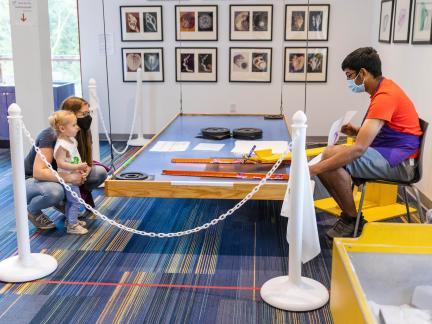
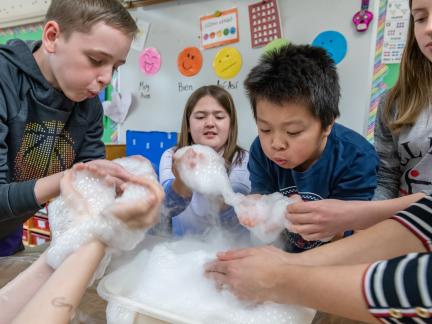
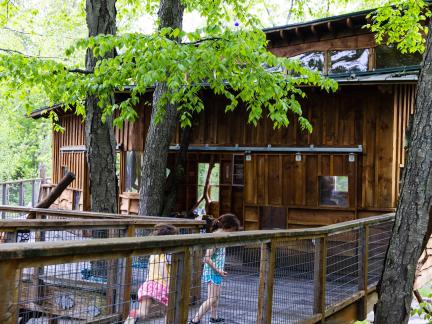
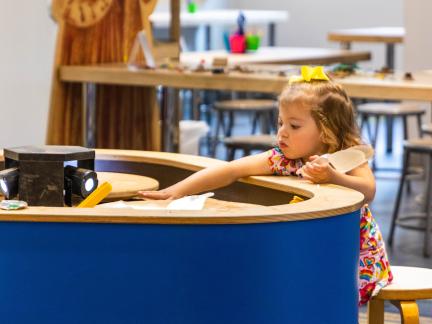
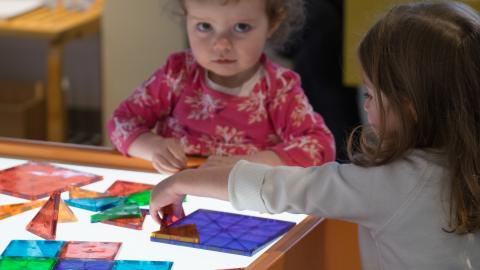
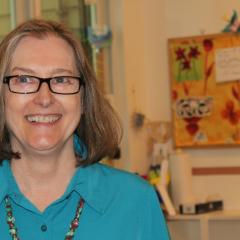
Comments
Add new comment